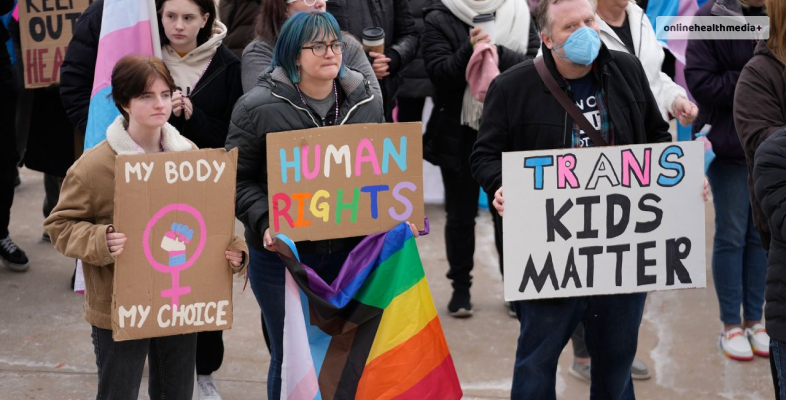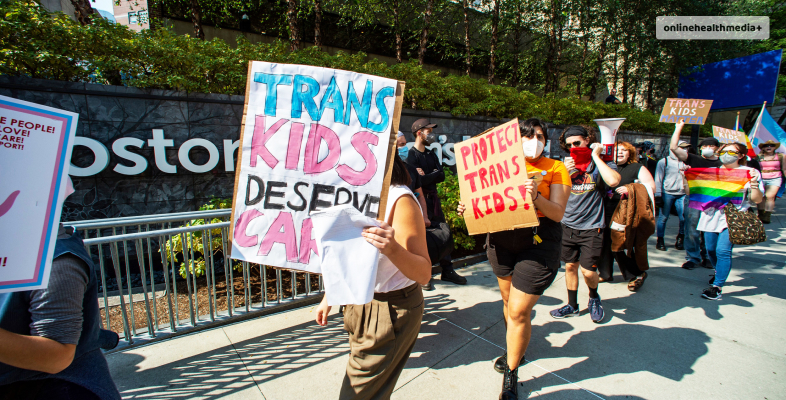Gender Affirming Care: Inclusive Support for All
In a rapidly evolving world, there is a growing recognition of the importance of inclusive healthcare. Gender-affirming care is an integral part of this movement, ensuring that individuals of all gender identities receive the support and medical services they need to align their physical attributes with their true selves.
In this article, we will explore gender-affirming care, its significance, and why using inclusive language is crucial in providing comprehensive healthcare services for transgender, non-binary, and gender-diverse individuals.
Contents
What Is Gender-Affirming Care?

Gender-affirming care is a comprehensive and compassionate approach to healthcare that supports individuals, particularly those who are transgender or gender-diverse, in aligning their physical characteristics and social identity with their affirmed gender.
It focuses on addressing the unique needs and challenges faced by these individuals, with the goal of improving their overall well-being and mental health.
Gender-affirming care can encompass a variety of services and treatments tailored to an individual’s specific needs.
Gender-affirming care is crucial in acknowledging and respecting an individual’s gender identity. It aims to address gender dysphoria (the distress associated with the incongruence between one’s gender identity and physical characteristics) and promote well-being.
By offering a range of services tailored to each person’s unique needs and ensuring that they are treated with respect and dignity, gender-affirming care plays a vital role in supporting individuals on their journey to living authentic lives.
Understanding Gender Affirmation

Gender affirmation is the process of enabling individuals to live as their true gender, rather than their assigned sex at birth. It is an umbrella term that encompasses a range of medical, psychological, and social interventions tailored to each person’s unique needs.
Gender-affirming care respects and validates a person’s gender identity, promoting their mental and physical well-being.
Inclusive Language in Healthcare
Inclusive language plays a pivotal role in reducing disparities in healthcare. It acknowledges and respects the gender diversity of patients and ensures they are treated with dignity and sensitivity. Here are key aspects of using inclusive language:
1. Respect Preferred Pronouns: Always address patients by the pronouns they identify with. For example, ‘she/her’ for a transgender woman or ‘they/them’ for non-binary individuals.
2. Avoid Making Assumptions: Don’t make assumptions about a person’s gender identity. Instead, use gender-neutral language when collecting medical history or personal information.
3. Medical Records and Documentation: Ensure that electronic health records and documentation systems allow for the recording of diverse gender identities. This helps in providing tailored care.
4. Cultural Competency: Training healthcare providers to be culturally competent ensures they can deliver patient-centered care and better understand the unique experiences of transgender and non-binary individuals.
Gender-Affirming Services:
Gender-affirming care offers a wide range of services, including but not limited to:
1. Hormone Therapy: Providing hormones, such as testosterone or estrogen, to align an individual’s physical characteristics with their gender identity.
2. Gender-Affirming Surgeries: Various surgeries, such as mastectomies, vaginoplasties, and phalloplasties, can be part of the gender affirmation process.
3. Mental Health Support: Access to mental health professionals experienced in gender identity issues to provide counseling and emotional support.
4. Voice and Speech Therapy: Assistance in aligning vocal characteristics with one’s gender identity.
5. Puberty Blockers: Offering treatments that delay the onset of puberty, providing more time for gender-affirming decisions.
Gender Affirming Care for Minors

Gender-affirming care is not exclusive to adults; it is equally vital for minors who are navigating their gender identities. Providing supportive, gender-affirming healthcare for transgender and gender-diverse youth is essential in fostering healthy development, mental well-being, and self-acceptance.
In this article, we will explore the significance of gender-affirming care for minors, the services it encompasses, and the importance of using inclusive language in pediatric healthcare.
Gender Identity Development in Minors
Understanding one’s gender identity can be a complex journey, and it often begins during childhood or adolescence.
Many transgender and gender-diverse minors experience distress when their physical attributes do not align with their gender identity.
Gender-affirming care can help address these concerns and ensure they feel supported and validated.
Importance Of Inclusive Language In Pediatric Care
Inclusive language is a cornerstone of gender-affirming care for minors. Utilizing appropriate terms and respectful communication is essential in creating a safe and affirming environment. Here are key aspects:
1. Respect Preferred Pronouns: Always use the pronouns and names that minors identify with. This shows respect for their identity and helps build trust.
2. Privacy and Confidentiality: Ensure that discussions about gender identity and healthcare remain confidential, protecting minors from potential harm or discrimination.
3. Open and Non-Judgmental Dialogue: Encourage open conversations with minors about their gender identity, using language that is neutral and non-judgmental. This can help them express their feelings and experiences more comfortably.
Gender-Affirming Services for Minors:
Gender-affirming care for minors involves a range of medical, psychological, and social services tailored to their unique needs. Here are some essential aspects of gender-affirming care for minors:
1. Mental Health Support: Offering minors access to mental health professionals who are experienced in gender identity issues, providing therapy and counseling to support their emotional well-being.
2. Puberty Blockers: These medications delay the onset of puberty, allowing minors more time to explore their gender identity before undergoing permanent physical changes. This is a reversible treatment that offers valuable time for decision-making.
3. Hormone Therapy: For older adolescents, hormone therapy may be considered, allowing them to align their physical characteristics with their gender identity. This step requires careful evaluation and monitoring.
4. Family Support: Involving parents and caregivers in gender-affirming care is crucial. Education and support for families can make a significant difference in a minor’s well-being.
Stigma Surrounding Gender Affirmation

The stigma surrounding gender affirmation is a significant challenge that transgender and gender-diverse individuals face when seeking gender-affirming care or openly expressing their gender identity.
This stigma is rooted in prejudice, misunderstanding, and societal norms, which can lead to discrimination, bias, and negative attitudes towards those who do not conform to traditional gender expectations.
Key Points About The Stigma Surrounding Gender Affirmation Include
1. Social Prejudice: Gender-affirming individuals often encounter social prejudice, bias, and stereotypes. Stigma can manifest in the form of microaggressions, insensitive comments, or outright discrimination in various social settings, from educational institutions to workplaces and healthcare facilities.
2. Barriers to Healthcare: The healthcare sector is not immune to the stigma associated with gender affirmation. Transgender and gender-diverse individuals may encounter healthcare professionals who are uninformed or insensitive about their unique needs. This can result in subpar care, delayed diagnosis, or a reluctance to seek medical help.
3. Mental Health Impact: Stigma and discrimination have a profound impact on mental health. Transgender and gender-diverse individuals are at higher risk of experiencing depression, anxiety, and suicidal ideation due to the negative societal attitudes and experiences of discrimination they face.
4. Economic Disparities: Discrimination in the workplace can result in economic disparities. Many gender-affirming individuals face unemployment, lower wages, or limited career advancement due to their gender identity. Economic instability can exacerbate existing challenges.
5. Violence and Harassment: Stigma can contribute to physical violence and harassment. Transgender individuals, particularly transgender women of color, face higher rates of violence and hate crimes, which have severe and often deadly consequences.
6. Mental Health Barriers: The stigma surrounding gender affirmation can create significant barriers to accessing mental health care. Individuals may avoid seeking help for fear of judgment or misunderstanding, leading to unmet mental health needs.
7. Legislative Discrimination: Many regions still lack legal protections against discrimination based on gender identity and expression. The absence of comprehensive legal safeguards can reinforce the stigma surrounding gender affirmation.
8. Intersectionality: The stigma faced by gender-affirming individuals intersects with other forms of discrimination, such as racism, ableism, and socioeconomic disparities. These overlapping prejudices can compound the challenges these individuals face.
Action For The Public
To combat the stigma surrounding gender affirmation, society must work towards greater understanding, inclusivity, and acceptance.
This includes educational initiatives, legal protections, and policy changes aimed at reducing discrimination.
It also calls for promoting empathy and advocating for respectful treatment and equal rights for all, regardless of gender identity.
By acknowledging and addressing the stigma surrounding gender affirmation, we can help create a more inclusive and accepting society where all individuals can live their lives authentically and without fear of discrimination.
Conclusion:
Gender-affirming care is essential for transgender, non-binary, and gender-diverse individuals. Inclusive language is an integral part of delivering respectful and comprehensive healthcare services.
Embracing diversity and respecting each person’s unique journey is not only an ethical imperative but also a testament to the progress of healthcare in becoming more inclusive and equitable.
By providing gender-affirming care and using inclusive language, healthcare professionals can make a positive difference in the lives of their patients.
Also Read
- Options For Addiction Treatment Programs.
- 4 Ways To Take Care Of Your Dental Health.
- Sciatica Pain 101: What It Is And How To Take Care Of The Condition.



